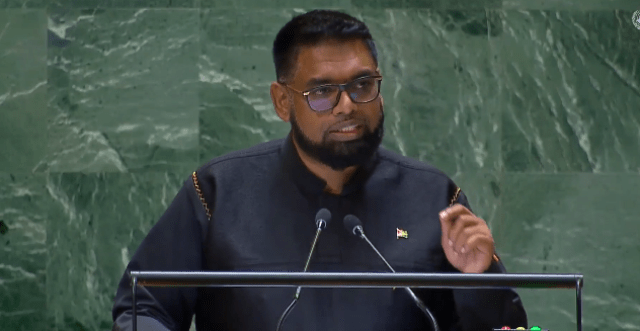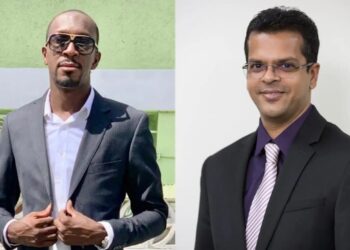Head of State, President Irfaan Ali’s address to the 79th Session of the United Nations General Assembly in New York, sought to underscore for global leaders present the crossroads facing multilateralism, urging world leaders to act decisively on global challenges.

In his presentation President Ali, reaffirmed the pressing need for reforms in the Security Council and the international financial system, particularly as they impact developing countries. He also emphasised the importance of tackling climate change, food insecurity, and energy crises, warning that failure to act will result in collective culpability in the “court of conscience.”
Using the annual occasion to address key global leaders, President Ali highlighted the devastating effects of climate change, particularly on small island developing states. He lamented the cycle of broken promises that characterise annual global summits such as the COP meetings, calling for concrete action to meet the Sustainable Development Goals (SDGs). Guyana, he noted, stands as a leader in biodiversity preservation, with 86% of its 83,000 square miles covered in tropical forest. The country’s forests store 19.5 gigatons of carbon, playing a crucial role in global climate mitigation
Global Biodiversity Alliance
In a significant announcement, President Ali launched the Global Biodiversity Alliance, which aims to establish markets for biodiversity credits, scale conservation debt swaps, and promote nature-positive actions. Guyana, he said, would double its protected areas by 2025 and meet the global target of protecting 30% of its biodiversity by 2030. This initiative, he argued, represents real solutions rather than rhetoric, positioning Guyana as a model for environmental leadership.
Another poignant aspect of the President’s address was his call for reforms in multilateral institutions, including the UN Security Council, the World Bank, and the IMF. The president emphasised that developing countries are calling for more inclusive and representative decision-making processes. Ali’s sentiments on the imbalance of power were clear: “The disproportionate concentration of power favours a few powerful nations whilst marginalising the voices and concerns of the broader international community.”
Touching on international conflicts, President Ali condemned the ongoing violence in Gaza, calling for an immediate ceasefire and the release of all hostages. He stressed that Israel’s actions have crossed into collective punishment, evoking fears of genocide. He also reaffirmed Guyana’s commitment to the Palestinian cause and the two-state solution.
1899 Arbitration
On the issue of Venezuela’s territorial claims on Guyana, President Ali reiterated Guyana’s firm stance for a peaceful resolution through the International Court of Justice (ICJ). He welcomed Venezuela’s participation in the ICJ proceedings, while reaffirming the 1899 arbitration that settled the border dispute. His remarks underscored Guyana’s reliance on international law as a shield against aggression.
In closing, President Ali was adamant, multilateralism, guided by the United Nations, must remain the key to achieving peace, sustainable development, and human dignity.
The future, he stressed, depends on decisive collective action, particularly from institutions tasked with upholding global governance.













